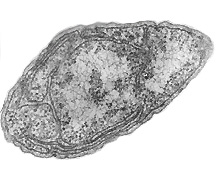Nitrosomonas europaea
A Microbial Biorealm page on the genus Nitrosomonas europaea
Classification
Higher order taxa
Domain; Phylum; Class; Order; family [Others may be used. Use NCBI link to find]
Domain: Prokaryota
Phylum: Proteobacteria
Class: Beta Proteobacteria
Order: Nitrosomonadales
Family: Nitrosomonadaceae
Genus: Nitrosomonas
Species: N. europea
Species
|
NCBI: Taxonomy |
Nitrosomonas europaea
Description and significance
Describe the appearance, habitat, etc. of the organism, and why it is important enough to have its genome sequenced. Describe how and where it was isolated. Include a picture or two (with sources) if you can find them.
Nitrosomonas europaea is a Gram negative chemolithoautroph with the shape of bacillus.
It is important enough to have its genome sequenced because this organism plays a central role in the availability of nitrogen to plants and hence in limiting C02 fixation. These bacteria are important players in the treatment of industrial and sewage waste in the first step of oxidizing ammonia to nitrate. N. europaea is also capable of degrading a variety of halogenated organic compounds, including trichloroethylene , benzene and vinyl chloride, which may make it an attractive organism for bioremediation.
Genome structure
Describe the size and content of the genome. How many chromosomes? Circular or linear? Other interesting features? What is known about its sequence? Does it have any plasmids? Are they important to the organism's lifestyle?
Cell structure and metabolism
Describe any interesting features and/or cell structures; how it gains energy; what important molecules it produces.
Ecology
Describe any interactions with other organisms (included eukaryotes), contributions to the environment, effect on environment, etc.
Pathology
How does this organism cause disease? Human, animal, plant hosts? Virulence factors, as well as patient symptoms.
Application to Biotechnology
Does this organism produce any useful compounds or enzymes? What are they and how are they used?
Current Research
Enter summaries of the most recent research here--at least three required
References
DOE JOINT GENOME INSTITUTE - US Department of Energy Office of Science[1] Wikipedia[2]
Edited by student of Rachel Larsen and Kit Pogliano

